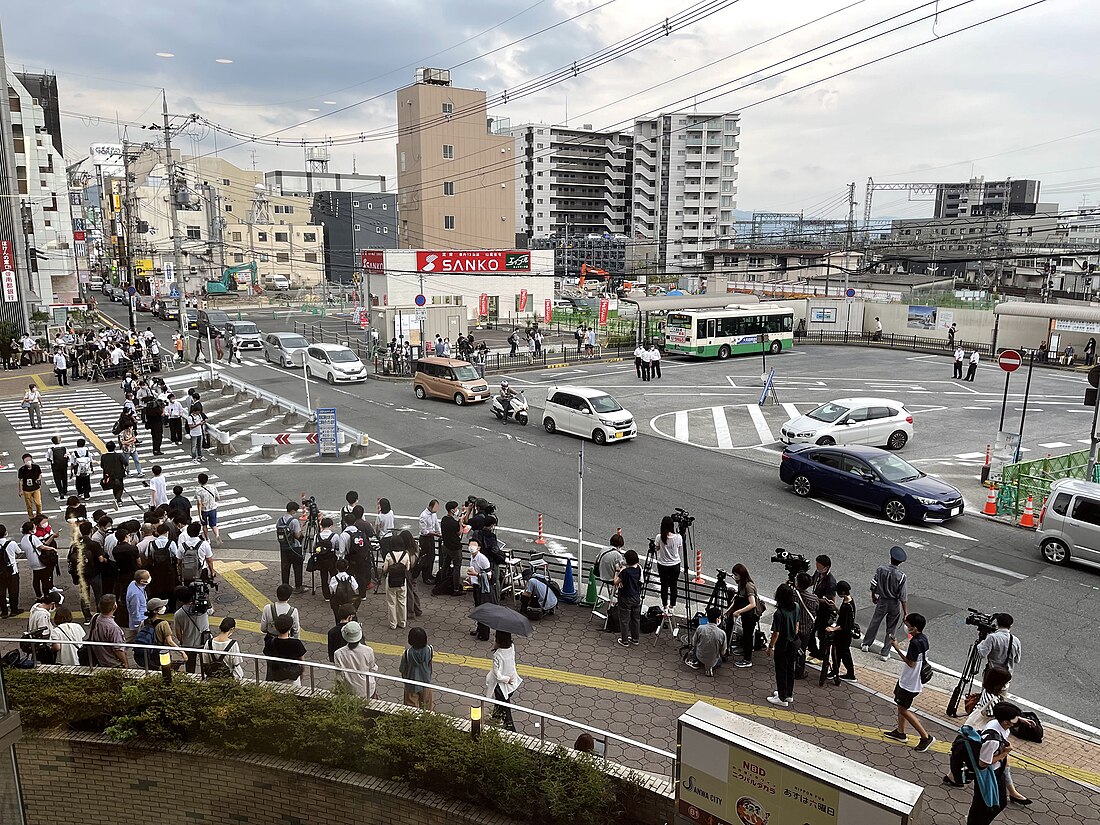Assassination of Shinzo Abe
2022 killing of former Japanese prime minister From Wikipedia, the free encyclopedia
Remove ads
On 8 July 2022, former Prime Minister of Japan Shinzo Abe was fatally shot during a campaign speech near Nara, Japan.[3]
His assassination was the first of a former Japanese prime minister since Saitō Makoto and Takahashi Korekiyo during the February 26 Incident in 1936, as well as the first of a former G7 leader since Italy's Aldo Moro in 1978.[4]
Remove ads
Attack and death
Abe was making a speech for the upcoming elections. He was shot twice from behind with an improvised shotgun, hitting his chest and neck.[5][6]
Abe was transported to a local hospital unconscious.[7] It was said he went into cardiopulmonary arrest shortly after being shot while other sources said he was having heart failure.[8][9]
Hours later, Abe's younger brother and Japan's defence minister Nobuo Kishi said Abe was having a blood transfusion.[10]
At 5:03 pm JST the news was broken that he had died, about five hours after the shooting happened. The doctors said that because he had lost a lot of blood, and the bullet had gone in deep enough to enter his heart. This news was reported by the public broadcaster NHK citing the ruling Liberal Democratic Party. It was also reported in a news conference at the medical hospital.[11]
The police autopsy found that Abe died from loss of blood after a bullet damaged an artery under his collarbone.[12]
Remove ads
Suspect
Tetsuya Yamagami, the shooter, was arrested by police at the scene.[13][14] Yamagami had created the shotgun used for the attack.[1]
Yamagami was a former member of the Maritime Self-Defense Force from 2002 to 2005.[15][16][17] Yamagami told investigators that he wanted to kill Abe because of a personal bad feelings toward a "certain religious group" (the Unification-Church, a branch of Christianity) that Abe had supported.[18][19] He said that this religious group had "brainwashed" his mother and that killing Abe was not because of his political beliefs.[20]
Remove ads
Aftermath
Prime Minister Fumio Kishida, who was in Yamagata Prefecture for the election campaign, cancelled campaigning and returned to Tokyo to deliver a national address, as did other Kishida cabinet members.[21] In his speech, he said that Abe was in critical condition and called the shooting "unforgivable".[22]
Many world leaders reacted to the shooting by hoping Abe recovered and condemned the shooting such as Emmanuel Macron, Joe Biden, Justin Trudeau, Jacinda Ardern, Boris Johnson, Anthony Albanese, Narendra Modi, Joseph M. Alberts, Ursula von der Leyen, Charles Michel, Jens Stoltenberg, Sauli Niinistö, Jair Bolsonaro, Tsai Ing-wen, and Recep Tayyip Erdogan along with former leaders such as Donald Trump, Barack Obama and Yoshihide Suga.[23][24]
Former Malaysian Prime Minister Mahathir Mohamad visited Japan to pay his condolences to Abe's widow, Akie Abe.[25] Mahathir also had a long relationship with Abe.[26]
References
Wikiwand - on
Seamless Wikipedia browsing. On steroids.
Remove ads

